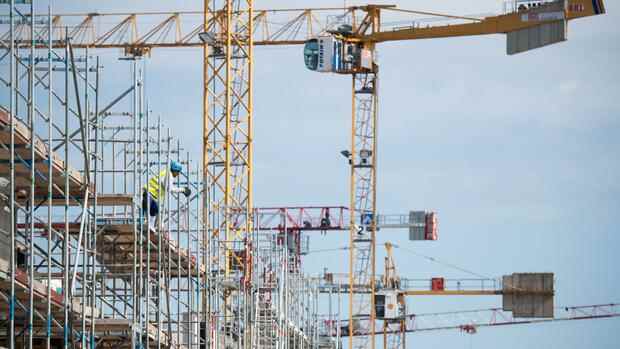This was the result of a current survey by the Institut der Deutschen Wirtschaft (IW), which the Handelsblatt has received in advance. The reason: there are fears of stricter regulatory provisions after the federal election, “especially if the SPD provides the chancellor,” explains IW expert and study author Michael Voigtländer.
According to the survey, the housing industry assesses its current business situation positively, but the majority of companies assume that their situation will deteriorate in the next twelve months.
Overall, the mood in the real estate industry is nevertheless good, shows the current ZIA-IW real estate mood index (ISI), which the Cologne Institute of the German Economy (IW) calculates quarterly in cooperation with the Handelsblatt and the umbrella association of the German real estate industry ZIA: With one value of 39.2, the real estate climate reached the highest value since the fourth quarter of 2018.
Top jobs of the day
Find the best jobs now and
be notified by email.
The data indicated that “the real estate industry is increasingly leaving the corona crisis behind and returning to pre-crisis levels,” says IW expert Voigtländer.
Good location, bad prospects
The real estate climate is mainly supported by the positive assessment of the current situation, which reaches a value of 71.7. This is an increase of more than ten points compared to the previous quarter. However, looking into the future slowed the overall index: the expected value has fallen to 10.6 points.
According to this, there is skepticism, especially in the residential segment: Here, the current situation is estimated at 61.5 points in the sub-index and thus worse than, for example, by project developers and also the owners of office properties. In addition, the expectation prevails that a new government will introduce stricter rental price regulations, comments IW expert Voigtländer.
Real estate prices expected to continue to rise
Most of the industry does not expect falling property prices and rents, on the contrary: While in the previous quarter only 36 percent of those surveyed assumed that property prices would continue to rise, the figure is now 54.4 percent.
Only 3.3 percent expect falling prices. In all segments considered (residential, office, retail), the number of those who expect prices to rise has increased, but the growth in the office sector is particularly noticeable: there, around 46 percent are now expecting prices to rise – according to the IW, this is a sign of the future The mood in the office market was unexpectedly good, despite the debate about working more from home.
Most of the industry is expecting higher apartment rents
As far as the development of rents is concerned, roughly the same number of companies expect rents to rise (48 percent) and constant rents (47 percent). However, there are clear differences between the segments: In the housing market, over 56 percent expect rents to rise, in the office market it is 32 percent and in retail just under 27 percent. In retail, even 20 percent of those surveyed expect rents to fall. In the previous quarter, however, it was 25 percent.
The real estate industry has apparently left behind the fear of rising financing conditions. Almost 85 percent of the companies surveyed assume that the financing conditions will remain the same. Only 15 percent expect a deterioration, in the last quarter it was 49 percent.
The discussions about higher inflation rates in the last quarter led to higher interest rates being expected. “In the meantime, however, there seems to be a consensus that inflation is only a temporary phenomenon, caused by restrictions in global logistics and as a result of special effects such as the increase in value added tax,” the survey said.
Longing for an own Ministry for Building
In view of the upcoming Bundestag election, the IW also asked about the wishes and demands of the new government in the current survey. In the first place, for many survey participants, there is a separate ministry for issues relating to the construction and real estate industry, especially for project developers.
Also the aspect proposed in the survey “dismantling of legal planning restrictions in order to be able to implement changes of use quickly” as well as “the fast and comprehensive digitization of the building authorities” and “a reduction in building costs through a reform of the building standards” received a lot of approval. “The focus of the industry is therefore very clearly on improving the framework conditions for construction and, in particular, on accelerating processes,” concludes the IW.
More: What really helps against the housing shortage
.
